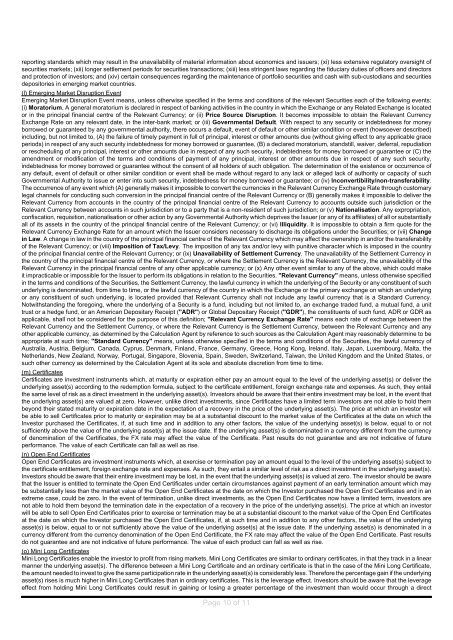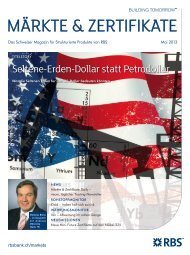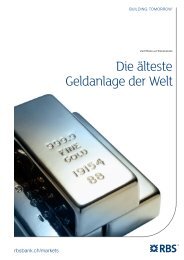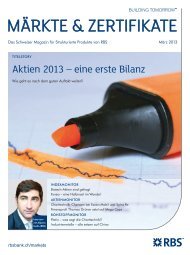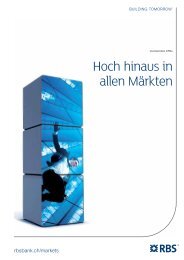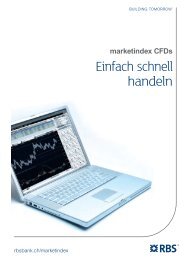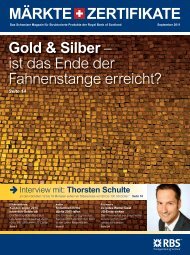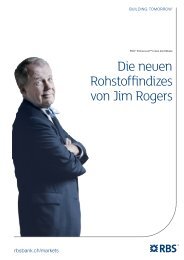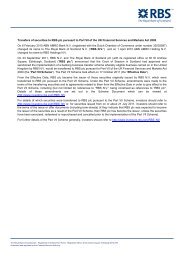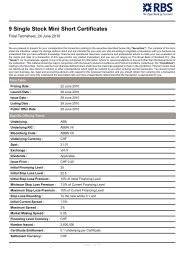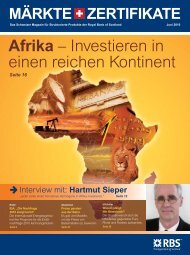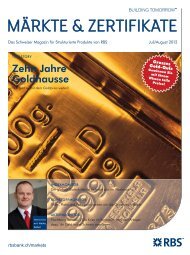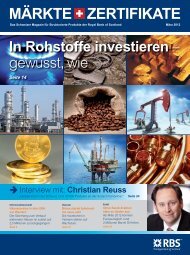3 Single Stock Mini Long Certificates - The Royal Bank of Scotland ...
3 Single Stock Mini Long Certificates - The Royal Bank of Scotland ...
3 Single Stock Mini Long Certificates - The Royal Bank of Scotland ...
Create successful ePaper yourself
Turn your PDF publications into a flip-book with our unique Google optimized e-Paper software.
eporting standards which may result in the unavailability <strong>of</strong> material information about economics and issuers; (xi) less extensive regulatory oversight <strong>of</strong><br />
securities markets; (xii) longer settlement periods for securities transactions; (xiii) less stringent laws regarding the fiduciary duties <strong>of</strong> <strong>of</strong>ficers and directors<br />
and protection <strong>of</strong> investors; and (xiv) certain consequences regarding the maintenance <strong>of</strong> portfolio securities and cash with sub-custodians and securities<br />
depositories in emerging market countries.<br />
(l) Emerging Market Disruption Event<br />
Emerging Market Disruption Event means, unless otherwise specified in the terms and conditions <strong>of</strong> the relevant Securities each <strong>of</strong> the following events:<br />
(i) Moratorium. A general moratorium is declared in respect <strong>of</strong> banking activities in the country in which the Exchange or any Related Exchange is located<br />
or in the principal financial centre <strong>of</strong> the Relevant Currency; or (ii) Price Source Disruption. It becomes impossible to obtain the Relevant Currency<br />
Exchange Rate on any relevant date, in the inter-bank market; or (iii) Governmental Default. With respect to any security or indebtedness for money<br />
borrowed or guaranteed by any governmental authority, there occurs a default, event <strong>of</strong> default or other similar condition or event (howsoever described)<br />
including, but not limited to, (A) the failure <strong>of</strong> timely payment in full <strong>of</strong> principal, interest or other amounts due (without giving effect to any applicable grace<br />
periods) in respect <strong>of</strong> any such security indebtedness for money borrowed or guarantee, (B) a declared moratorium, standstill, waiver, deferral, repudiation<br />
or rescheduling <strong>of</strong> any principal, interest or other amounts due in respect <strong>of</strong> any such security, indebtedness for money borrowed or guarantee or (C) the<br />
amendment or modification <strong>of</strong> the terms and conditions <strong>of</strong> payment <strong>of</strong> any principal, interest or other amounts due in respect <strong>of</strong> any such security,<br />
indebtedness for money borrowed or guarantee without the consent <strong>of</strong> all holders <strong>of</strong> such obligation. <strong>The</strong> determination <strong>of</strong> the existence or occurrence <strong>of</strong><br />
any default, event <strong>of</strong> default or other similar condition or event shall be made without regard to any lack or alleged lack <strong>of</strong> authority or capacity <strong>of</strong> such<br />
Governmental Authority to issue or enter into such security, indebtedness for money borrowed or guarantee; or (iv) Inconvertibility/non-transferability.<br />
<strong>The</strong> occurrence <strong>of</strong> any event which (A) generally makes it impossible to convert the currencies in the Relevant Currency Exchange Rate through customary<br />
legal channels for conducting such conversion in the principal financial centre <strong>of</strong> the Relevant Currency or (B) generally makes it impossible to deliver the<br />
Relevant Currency from accounts in the country <strong>of</strong> the principal financial centre <strong>of</strong> the Relevant Currency to accounts outside such jurisdiction or the<br />
Relevant Currency between accounts in such jurisdiction or to a party that is a non-resident <strong>of</strong> such jurisdiction; or (v) Nationalisation. Any expropriation,<br />
confiscation, requisition, nationalisation or other action by any Governmental Authority which deprives the Issuer (or any <strong>of</strong> its affiliates) <strong>of</strong> all or substantially<br />
all <strong>of</strong> its assets in the country <strong>of</strong> the principal financial centre <strong>of</strong> the Relevant Currency; or (vi) Illiquidity. It is impossible to obtain a firm quote for the<br />
Relevant Currency Exchange Rate for an amount which the Issuer considers necessary to discharge its obligations under the Securities; or (vii) Change<br />
in Law. A change in law in the country <strong>of</strong> the principal financial centre <strong>of</strong> the Relevant Currency which may affect the ownership in and/or the transferability<br />
<strong>of</strong> the Relevant Currency; or (viii) Imposition <strong>of</strong> Tax/Levy. <strong>The</strong> imposition <strong>of</strong> any tax and/or levy with punitive character which is imposed in the country<br />
<strong>of</strong> the principal financial centre <strong>of</strong> the Relevant Currency; or (ix) Unavailability <strong>of</strong> Settlement Currency. <strong>The</strong> unavailability <strong>of</strong> the Settlement Currency in<br />
the country <strong>of</strong> the principal financial centre <strong>of</strong> the Relevant Currency, or where the Settlement Currency is the Relevant Currency, the unavailability <strong>of</strong> the<br />
Relevant Currency in the principal financial centre <strong>of</strong> any other applicable currency; or (x) Any other event similar to any <strong>of</strong> the above, which could make<br />
it impracticable or impossible for the Issuer to perform its obligations in relation to the Securities. "Relevant Currency" means, unless otherwise specified<br />
in the terms and conditions <strong>of</strong> the Securities, the Settlement Currency, the lawful currency in which the underlying <strong>of</strong> the Security or any constituent <strong>of</strong> such<br />
underlying is denominated, from time to time, or the lawful currency <strong>of</strong> the country in which the Exchange or the primary exchange on which an underlying<br />
or any constituent <strong>of</strong> such underlying, is located provided that Relevant Currency shall not include any lawful currency that is a Standard Currency.<br />
Notwithstanding the foregoing, where the underlying <strong>of</strong> a Security is a fund, including but not limited to, an exchange traded fund, a mutual fund, a unit<br />
trust or a hedge fund, or an American Depositary Receipt ("ADR") or Global Depositary Receipt ("GDR"), the constituents <strong>of</strong> such fund, ADR or GDR as<br />
applicable, shall not be considered for the purpose <strong>of</strong> this definition; "Relevant Currency Exchange Rate" means each rate <strong>of</strong> exchange between the<br />
Relevant Currency and the Settlement Currency, or where the Relevant Currency is the Settlement Currency, between the Relevant Currency and any<br />
other applicable currency, as determined by the Calculation Agent by reference to such sources as the Calculation Agent may reasonably determine to be<br />
appropriate at such time; "Standard Currency" means, unless otherwise specified in the terms and conditions <strong>of</strong> the Securities, the lawful currency <strong>of</strong><br />
Australia, Austria, Belgium, Canada, Cyprus, Denmark, Finland, France, Germany, Greece, Hong Kong, Ireland, Italy, Japan, Luxembourg, Malta, the<br />
Netherlands, New Zealand, Norway, Portugal, Singapore, Slovenia, Spain, Sweden, Switzerland, Taiwan, the United Kingdom and the United States, or<br />
such other currency as determined by the Calculation Agent at its sole and absolute discretion from time to time.<br />
(m) <strong>Certificates</strong><br />
<strong>Certificates</strong> are investment instruments which, at maturity or expiration either pay an amount equal to the level <strong>of</strong> the underlying asset(s) or deliver the<br />
underlying asset(s) according to the redemption formula, subject to the certificate entitlement, foreign exchange rate and expenses. As such, they entail<br />
the same level <strong>of</strong> risk as a direct investment in the underlying asset(s). Investors should be aware that their entire investment may be lost, in the event that<br />
the underlying asset(s) are valued at zero. However, unlike direct investments, since <strong>Certificates</strong> have a limited term investors are not able to hold them<br />
beyond their stated maturity or expiration date in the expectation <strong>of</strong> a recovery in the price <strong>of</strong> the underlying asset(s). <strong>The</strong> price at which an investor will<br />
be able to sell <strong>Certificates</strong> prior to maturity or expiration may be at a substantial discount to the market value <strong>of</strong> the <strong>Certificates</strong> at the date on which the<br />
Investor purchased the <strong>Certificates</strong>, if, at such time and in addition to any other factors, the value <strong>of</strong> the underlying asset(s) is below, equal to or not<br />
sufficiently above the value <strong>of</strong> the underlying asset(s) at the issue date. If the underlying asset(s) is denominated in a currency different from the currency<br />
<strong>of</strong> denomination <strong>of</strong> the <strong>Certificates</strong>, the FX rate may affect the value <strong>of</strong> the Certificate. Past results do not guarantee and are not indicative <strong>of</strong> future<br />
performance. <strong>The</strong> value <strong>of</strong> each Certificate can fall as well as rise.<br />
(n) Open End <strong>Certificates</strong><br />
Open End <strong>Certificates</strong> are investment instruments which, at exercise or termination pay an amount equal to the level <strong>of</strong> the underlying asset(s) subject to<br />
the certificate entitlement, foreign exchange rate and expenses. As such, they entail a similar level <strong>of</strong> risk as a direct investment in the underlying asset(s).<br />
Investors should be aware that their entire investment may be lost, in the event that the underlying asset(s) is valued at zero. <strong>The</strong> investor should be aware<br />
that the Issuer is entitled to terminate the Open End <strong>Certificates</strong> under certain circumstances against payment <strong>of</strong> an early termination amount which may<br />
be substantially less than the market value <strong>of</strong> the Open End <strong>Certificates</strong> at the date on which the Investor purchased the Open End <strong>Certificates</strong> and in an<br />
extreme case, could be zero. In the event <strong>of</strong> termination, unlike direct investments, as the Open End <strong>Certificates</strong> now have a limited term, investors are<br />
not able to hold them beyond the termination date in the expectation <strong>of</strong> a recovery in the price <strong>of</strong> the underlying asset(s). <strong>The</strong> price at which an investor<br />
will be able to sell Open End <strong>Certificates</strong> prior to exercise or termination may be at a substantial discount to the market value <strong>of</strong> the Open End <strong>Certificates</strong><br />
at the date on which the Investor purchased the Open End <strong>Certificates</strong>, if, at such time and in addition to any other factors, the value <strong>of</strong> the underlying<br />
asset(s) is below, equal to or not sufficiently above the value <strong>of</strong> the underlying asset(s) at the issue date. If the underlying asset(s) is denominated in a<br />
currency different from the currency denomination <strong>of</strong> the Open End Certificate, the FX rate may affect the value <strong>of</strong> the Open End Certificate. Past results<br />
do not guarantee and are not indicative <strong>of</strong> future performance. <strong>The</strong> value <strong>of</strong> each product can fall as well as rise.<br />
(o) <strong>Mini</strong> <strong>Long</strong> <strong>Certificates</strong><br />
<strong>Mini</strong> <strong>Long</strong> <strong>Certificates</strong> enable the investor to pr<strong>of</strong>it from rising markets. <strong>Mini</strong> <strong>Long</strong> <strong>Certificates</strong> are similar to ordinary certificates, in that they track in a linear<br />
manner the underlying asset(s). <strong>The</strong> difference between a <strong>Mini</strong> <strong>Long</strong> Certificate and an ordinary certificate is that in the case <strong>of</strong> the <strong>Mini</strong> <strong>Long</strong> Certificate,<br />
the amount needed to invest to give the same participation rate in the underlying asset(s) is considerably less. <strong>The</strong>refore the percentage gain if the underlying<br />
asset(s) rises is much higher in <strong>Mini</strong> <strong>Long</strong> <strong>Certificates</strong> than in ordinary certificates. This is the leverage effect. Investors should be aware that the leverage<br />
effect from holding <strong>Mini</strong> <strong>Long</strong> <strong>Certificates</strong> could result in gaining or losing a greater percentage <strong>of</strong> the investment than would occur through a direct<br />
Page 10 <strong>of</strong> 11


